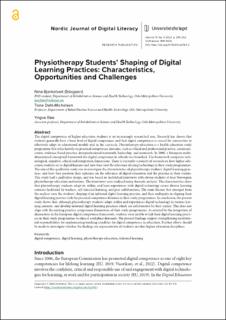Physiotherapy Students’ Shaping of Digital Learning Practices: Characteristics, Opportunities and Challenges
Peer reviewed, Journal article
Published version
Permanent lenke
https://hdl.handle.net/11250/3111445Utgivelsesdato
2023Metadata
Vis full innførselSamlinger
Sammendrag
The digital competence of higher education students is an increasingly researched area. Research has shown that
students generally have a basic level of digital competence, and that digital competence is crucial for universities to
effectively adapt to educational models and in the curricula. Physiotherapy education is a health education study
programme that relies heavily on practical competence domains, such as ethical and professional practice, communi-
cation, evidence-based practice, interprofessional teamwork, leadership, and teamwork. In 2008, a European multi-
dimensional conceptual framework for digital competence in schools was launched. The framework comprises tech-
nological, cognitive, ethical and integration dimensions. There is currently a paucity of research on how higher edu-
cation students act as digital learners and how they view the relevance of using technology in their study programmes.
The aim of this qualitative study was to investigate the characteristics of physiotherapy students’ digital learning prac-
tices, and how they position their opinions on the relevance of digital education and the practice in their studies.
This study had a qualitative design, and was based on individual interviews with eleven students at four Norwegian
physiotherapy education institutions. The interviews were analysed using thematic analysis. The characteristics show
that physiotherapy students adapt to, utilize, and have experiences with digital technology across diverse learning
contexts facilitated by teachers, self-directed learning, and peer collaboration. The main themes that emerged from
the analysis were the students’ shaping of an informal digital learning practice, and their ambiguity in aligning their
digital learning practice with the practical competence domains in their study programmes. In conclusion, the present
study shows that, although physiotherapy students adapt, utilize and experiences digital technology in various lear-
ning contexts, and develop informal digital learning practices which are collaborative by their nature. This does not
align with the existing practice competence dimensions of their study programmes. As covered by the integration of
dimensions in the European digital competence framework, students were unable to link their digital learning practi-
ces in their study programmes to clinical workplace demands. The present findings support strengthening institutio-
nal responsibilities for implementing teaching schedules for digital competence in education. Further efforts should
be made to investigate whether the findings are representative of students in other higher education disciplines.

